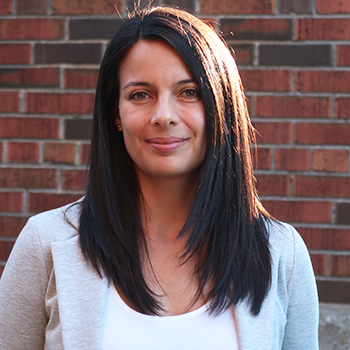New research co-led by Luisa Sotomayor, an associate professor in the Faculty of Environmental and Urban Change, and researchers at the University of Toronto and Ryerson University, reports that students lack affordable, adequate and sufficient housing options that would enable them to live close to their campus.
By Krista Davidson

Toronto’s city-wide rental housing shortage has created significant barriers for post-secondary students in securing safe and affordable housing. While strong demand for student housing has prompted the development of luxury condo-style private residences in recent years, many students find the new private student accommodations expensive and beyond reach. As a result, many students attending Toronto academic institutions must work multiple jobs and hustle to pay expensive rents. Others are subjected to precarious and informal rental agreements that preclude them from tenants’ rights and expose them to hazards such as overcrowding and unsafe living arrangements.
The research, published in Cities, examines the experiences of 139 students attending Toronto’s four universities (OCAD University, Ryerson University, University of Toronto and York University) through focus groups that took place in 2018 and 2019. The focus groups identified students’ experiences with housing, including how students accessed housing, their preferences, and how their housing situation impacted their academic standing, as well as their mental health and economic well-being.
The research, which is supported with funding from the presidents of the four Toronto Universities through the StudentDwellTO project and a Social Sciences & Humanities Research Council (SSHRC) grant, found that inadequate housing experiences affect students to the degree that it significantly impacted their quality of living. Although student status is assumed as a full-time occupation, many students spend an inordinate amount of time in the “hustle economy,” juggling multiple part-time jobs, complex responsibilities, and trying to address their housing insecurity and financial stress.
Furthermore, it found that student housing struggles were normalized and forced students to be resourceful in securing basic housing needs. The research found that housing struggles further marginalized students and reproduced social hierarchies in class, gender racialized and ageist divides.
“For years, we have turned a blind eye on the living situations of students, sometimes with the belief that students who live in inadequate conditions must ‘pay their dues,’ or that it is a ‘rite of passage.’ The research shows that for many students – including those from low-income backgrounds – the housing hustle has become a central part of their university experience. Given Toronto’s expensive rentals, many young people may continue living ‘house poor’ following their graduation,” says Sotomayor.
The research debunks common presumptions about post-secondary students that take for granted parental economic support and homogenous middle-class backgrounds.
“Students are a particularly vulnerable group in the housing landscape because they don’t have strong housing rights or a voice in planning processes and policies that affect them. Their identities are often generalized as middle-class, yet many students are first generation or from very marginalized households,” adds Sotomayor. “Students are also less likely than other groups to find the support they need from politicians or cities. While students contribute substantially to the economic, social and cultural life of the city, they are essentially invisible to local governments.”
Research calls for more support and involvement for student housing options
The paper calls on universities to advocate on behalf of students, as well as engage students to have a say in planning and policy related to student housing. Universities and municipalities need to work together to prioritize and license rooming houses around campus to ensure students have safety and affordability.
“As a society, we are very focused on home ownership and students are often overlooked because they don’t participate in the market as homeowners. We tend to overlook people who pay rent and perceive them as transient, but those are precisely the housing needs we need to focus on,” explains Sotomayor.
As a result, more student-led groups have organized for better student housing. One such group, the York Village Housing Association, which constitutes students, provides up-to-date information to incoming and other students on how students can secure affordable and safe housing, and what to look out for when renting.
Some cities, such as Montreal, have demonstrated success in safe, affordable housing for students through co-operatives that enable students to share in the responsibility of house maintenance. Other recommendations include intergenerational HomeShare initiatives, in which students live with seniors and pay low-cost rent in exchange for providing support around the home.
Research that contributes to the United Nations 17 Sustainable Development Goals
The research and advocacy work in supporting affordable student housing supports the University’s goals in elevating York’s contributions to the UNSDGs, specifically, SDG 1 which calls for mobilizing policies to end poverty, ensure equal rights to resources and build resilience of the poor from all kinds of disasters.
“If students’ needs aren’t met, it can impact housing for other groups. Students often share housing and split the rent. This can outbid others, including seniors and low-income families that rely on affordable housing,” says Sotomayor.


